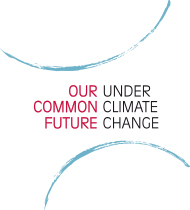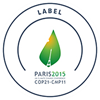Summary
The IHEST European Summer School� will compare multiple perspectives on climate change, on the boundaries of science and society.� By comparing approaches and points of view, the speakers and participants will be asked to shed light on the processes underway, to identify the normatives at work, be they scientific, political, economic or social, to discern the nature of the controversies specific to this major issue, and the nature of the choices confronting politicians, caught between short-term interests and long-term stakes. What does the climate change issue tell us about the dialogue between science and society? These will be the guiding themes of the seminar.
Day 1 : Climate and temporalities
How has climate change become the subject of inquiry into both its causes and origins? This will be the first question of the seminar, which will open with analyses of varying temporalities, between the past, present and future. Are we currently experiencing a discontinuity tied to the possible irreversibility of the process of climate change? What are the challenges in terms of knowledge? A long, historical process, climate change has suddenly become an urgent matter, given the acute potential consequences. What historical, climatological, socio-economic and philosophical analyses can provide some response? What can be said about climate prior to the birth of climate science? What climate stories tell us ? Which time and space scales to characterize climate change?
Day 2 : Climate change: how to grasp and speak about the issue
Before thinking about acting against climate change, how do we speak about it, give substance to its effects, and comprehend the gap between perceptions of meteorological phenomena and hypotheses put forward by climate sciences, in all their complexity and uncertainty? This is a real challenge in pedagogical terms. More specifically, what processes are needed to ascertain, evaluate and debate the stakes of climate change? The second day of the seminar will focus on identifying and exploring these processes, in differing contexts such as the media, education, cultural initiatives and new climate services in France and elsewhere around the world.
Furthermore, what do controversies around climate change teach us? What are the objects of the attacks? Is the debate actually limited to questioning standard scientific study?� Can we effectively combat climate change without improving education? Do political choices hinge on a better scientific understanding of the subject? What is the impact of mediatization? More broadly, how can people be encouraged to fight against climate change?
Day 3 : Reacting to climate change
Management of knowledge and the production of data, the interface between expertise and policy, economics and technology: these are areas where we find innovations in the fight against climate change and which will be analyzed during the third day. Are these innovations necessarily synonymous with progress? What are the underlying utopias?
The inter-government panel on climate change (IPCC) is presented as an innovative model of organization, coordination and co-decision between scientists and policy-makers. How does expertise function within this organization? Who can legitimately report on climate and produce data? Is the organization no more than a venue for confrontation between science and policy? How are decisions crafted?
Day 4 : Climate change: the challenge of global governance
The fight against climate change is an affair of States and of citizens. It requires trade-offs and decisions which involve policy, expertise, law, economics, diplomacy, and, above all, public participation. Climate change raises the fundamental question of the legitimacy of global governance, its democratic basis and concerns of justice in the face of climatic inequality. What is the responsibility of countries in the climate situation? Who must make an effort, and to what extent? How can we manage interdependence between the local, regional and international levels, where the decision of one may interfere with the situation of another? What are the stakes of governance? What are the main challenges and points of international dispute?



